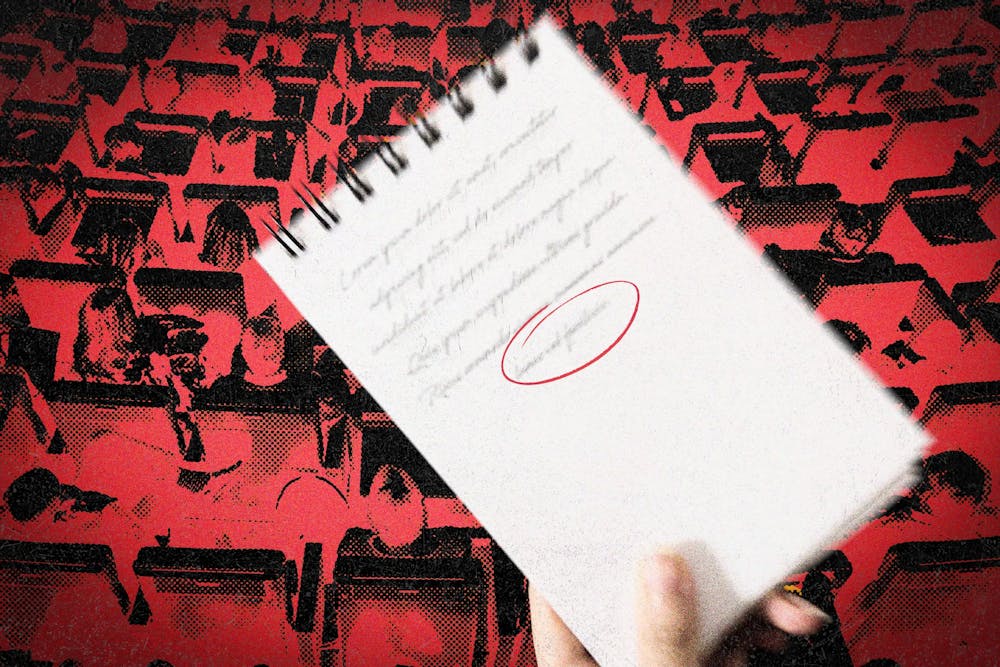On Aug. 26, I woke up to a harsh chunk of sunlight slicing through the gap between my blackout curtain panel and the wall. It wasn’t even the tiniest bit cinematic; in no way was I expecting the sudden harmonious sounds of chirping birds and Disney backing tracks to signal the start of my day.
In reality, my neck was sore from unfavorable twin XL sleeping positions, I was extremely sweaty and had a faint migraine creeping into the center of my head. I glanced at the microwave, which flashed 8 a.m. in its cruel, green font. I am certain a part of me died at that very moment. It was Monday, the first day of school, and I didn’t have class until 2:50 p.m.
I found it quite fitting to do what any normal student would: use 90% of my brain power trying to ignore the real-life college classes looming over me. The other 10% was, unfortunately, trying to convince me that my childhood was over and the world was ending.
Earlier this year I was a 17-year-old kid with a beautiful, tangible high school diploma. Now I’m an 18-year-old undergraduate student – and dare I say still a kid – in college with a dream and another degree to obtain. Yet during that morning, I never imagined that college would land me in a lecture hall at 4:25 p.m. each Monday and Wednesday where I cry every class.
This class, social justice perspectives, astounds me. As my professor was wrapping up our first discussion about something called the veil of ignorance, which assumes a perfect society that relies on creating an initial state of equality for everyone, I admit I was a little teary-eyed. When I got back to my room, I launched myself into bed and reread all my notes with salty tears dripping down my face.
I figured it was just an overall emotional day for me, and there would be a lot less tear-jerking the next time around. I was wrong. I cry almost every single time I have that class.
Professor Mark Curnette notes that “behind all of the statistics I use in my textbook and in my classes are human beings, whose lives are greatly harmed or made difficult by the many social constructs of inequality.”
His class encompasses the large social injustices of society and the subsequent issues with women’s rights, racism, poverty, education access, immigration, mass incarceration and more.
I was surprised to learn how little we accomplish trying to fight these aforementioned inequalities. Even those who are firm believers in morality and ethics can have little to no effect on the injustices of our world; unfortunately, it’s often human nature to create, maintain and enforce inequality.
I like to view the concepts Curnette teaches as a lot of big and little “priori truths” and “posteriori truths,” knowledge that is independent of any experience and knowledge that is based on experience, respectively. I say this because, on one hand, I have never experienced racial discrimination, but I know it is real. I have never experienced getting pulled over just because I appear dangerous, but I know it happens.
On the other hand, I have experienced gender discrimination, so I know it is real. I have experienced being overlooked in the STEM field because I am a female, so I know it happens.
As much as Curnette stays well within fact and reason, there is always a wave of his words that overflows into the appeal of pathos. The overwhelming nonfiction of the material presented in this class tugs on my heartstrings and evokes the inevitable waterfall of tears I am now so familiar with.
Enjoy what you're reading?
Signup for our newsletter
I do not deny that I’m an emotional individual. From a young age, I’ve been viewed as too vulnerable, too sensitive and too empathetic. Walking out of the movie theater after a particularly earth-shattering film gives me the same empty pit in my stomach as a plastic water bottle carelessly thrown into the bushes. I feel things deeply, and my brain constantly contemplates the world’s melancholy.
It is not necessarily depression that drives this, but passion. I am passionate, both about the things I love and the things I am learning. It’s the sudden onset of tears flowing from my eyes every Monday and Wednesday evening that reminds me how important the privilege of learning is, and that it’s okay to have as much passion as I do.
Jada Rogers is a first-year currently exploring as an undecided student. She is a writer for the opinion section of The Student and a member of the American Institute of Professional Geologists, the Miami Green Team and Paws for a Cause.




